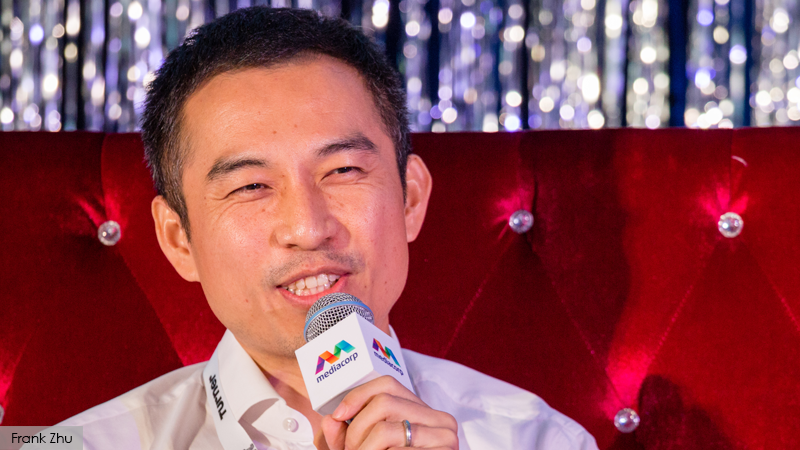
China’s content boom has created unprecedented opportunities for investment in entertainment. Production is at a record high and Chinese TV series and movies have a whole new profile around the world. At the same time, the country remains a magnet for Asian as well as global talent, Chinese authorities are backing an unprecedented international agenda, and nimble deal making is keeping more international players on their toes. The challenges include the evolution of regulations, fast-forward time lines, and sometimes incompatible processes. Frank Zhu, chief executive of Shanghai-based Pearl Studio, talks about the space between the rampant opportunity and dramatic shifts in a market where animated films have US$100-million budgets, where challenges are as common as ambitious dreams of fortune, and enthusiasm for local partnerships is as high as the push for cross-border content investment and development.

The challenge of taking Chinese or Asian stories around the world is “not the story itself,” says Frank Zhu, chief executive of mainland Chinese indie, Pearl Studio (formerly Oriental DreamWorks). “It is always the way we tell the story... how do we share the story and pitch the story in a way that it could travel around the world?” This storytelling technique and talent doesn’t necessarily exist in China. Yet. But it’s on its way...
In the wake of Crazy Rich Asians, Zhu predicts global interest in Asian stories will increase and will spread to television and other platforms. “I believe there is rising interest in and popularity of Asian stories,” he says.
Pearl Studio, which in its previous incarnation produced Kung Fu Panda 3, is now owned by mainland Chinese media mogul Li Ruigang’s US$6-billion China Media Capital (CMC) and has offices in the U.S. and China. The studio relaunched as a wholly owned CMC entity at the beginning of this year, with newfound freedom to partner with anyone it likes, including all Hollywood studios.
The mission, Zhu says, is to create premium family entertainment with a global footprint. “Our mission is to be a premium family entertainment brand. We’re trying to create family content in China, rooted in China but able to travel around the world, just like what we did with Kung Fu Panda”.
By 2022, Pearl Studio plans to release two films a year with China-related stories for the global market. Current budgets can top US$100 million, with a mix of tentpole features and speciality re...
China’s content boom has created unprecedented opportunities for investment in entertainment. Production is at a record high and Chinese TV series and movies have a whole new profile around the world. At the same time, the country remains a magnet for Asian as well as global talent, Chinese authorities are backing an unprecedented international agenda, and nimble deal making is keeping more international players on their toes. The challenges include the evolution of regulations, fast-forward time lines, and sometimes incompatible processes. Frank Zhu, chief executive of Shanghai-based Pearl Studio, talks about the space between the rampant opportunity and dramatic shifts in a market where animated films have US$100-million budgets, where challenges are as common as ambitious dreams of fortune, and enthusiasm for local partnerships is as high as the push for cross-border content investment and development.

The challenge of taking Chinese or Asian stories around the world is “not the story itself,” says Frank Zhu, chief executive of mainland Chinese indie, Pearl Studio (formerly Oriental DreamWorks). “It is always the way we tell the story... how do we share the story and pitch the story in a way that it could travel around the world?” This storytelling technique and talent doesn’t necessarily exist in China. Yet. But it’s on its way...
In the wake of Crazy Rich Asians, Zhu predicts global interest in Asian stories will increase and will spread to television and other platforms. “I believe there is rising interest in and popularity of Asian stories,” he says.
Pearl Studio, which in its previous incarnation produced Kung Fu Panda 3, is now owned by mainland Chinese media mogul Li Ruigang’s US$6-billion China Media Capital (CMC) and has offices in the U.S. and China. The studio relaunched as a wholly owned CMC entity at the beginning of this year, with newfound freedom to partner with anyone it likes, including all Hollywood studios.
The mission, Zhu says, is to create premium family entertainment with a global footprint. “Our mission is to be a premium family entertainment brand. We’re trying to create family content in China, rooted in China but able to travel around the world, just like what we did with Kung Fu Panda”.
By 2022, Pearl Studio plans to release two films a year with China-related stories for the global market. Current budgets can top US$100 million, with a mix of tentpole features and speciality releases on different distribution platforms. Television projects are also part of the mix.
Creative output is driven by a diverse team balanced between China and the U.S., and refreshed by, among other elements, the ongoing artists residential programme that brings artists from Hollywood to China to work with Pearl Studio. Creative development initiatives also include the Brain Trust Summit, which gathers some of the world’s best storytellers in Shanghai every year. “We have a unique creative capability,” Zhu says.
Zhu currently has more than a dozen projects in development, including Pearl Studio’s first original film, Abominable (formerly called Everest), a tent pole animated feature co-produced with DreamWorks and distributed by Universal Pictures outside China. Abominable is the story of friends who embark on an epic 3,000-mile journey from the streets of Shanghai to the peaks of the Himalayas to reunite a stray Yeti with his family. The film, directed by Jill Culton, releases in September 2019.
The studio is also currently producing musical adventure feature Over The Moon, directed by legendary animator Glen Keane and scheduled for release in 2020. Over The Moon is the story of a girl who builds a rocket ship and sets off into space to follow her dream of meeting a Moon Goddess. The film will be distributed theatrically in Greater China by Pearl Studio and by Netflix worldwide.
Zhu says the relationship with Netflix (which includes some theatrical exposure in the U.S.) combines Pearl’s mainland network with the streaming platform’s revolutionary global model in a “unique combination” Pearl is trying for the first time with Over The Moon. Netflix streaming service is not available in China.
“China is the fastest growing theatrical market in the world, while in the rest of the world Netflix has revolutionised the whole business model. This is why we chose the combination,” Zhu says.
Pearl Studio’s third current feature, epic adventure tale The Monkey King, is part of a development deal with Hong Kong director Stephen Chow (The Mermaid, Journey to the West: Conquering the Demons). The Monkey King is written by Ron Friedman and Steve Bencich, whose animated film credits include Brother Bear and Chicken Little.
The ancillary business is a critical revenue stream. Kung Fu Panda 3’s global box office topped US$520 million. The domestic Chinese box office was RMB1 billion/US$145.5 million – the highest of all time for an animated film in China – and ancillary retail sales hit RMB1.5 billion/US$218.3 million. Pearl Studio developed more than 2,000 consumer products for the films. “The ancillary business is important in China, especially in a family entertainment business,” Zhu says.
All Pearl Studio’s titles have a Chinese cultural component. As Zhu says: “We want to present the beauty of China to the world”.
Published in ContentAsia's Issue Five 2018, 4 October 2018






















